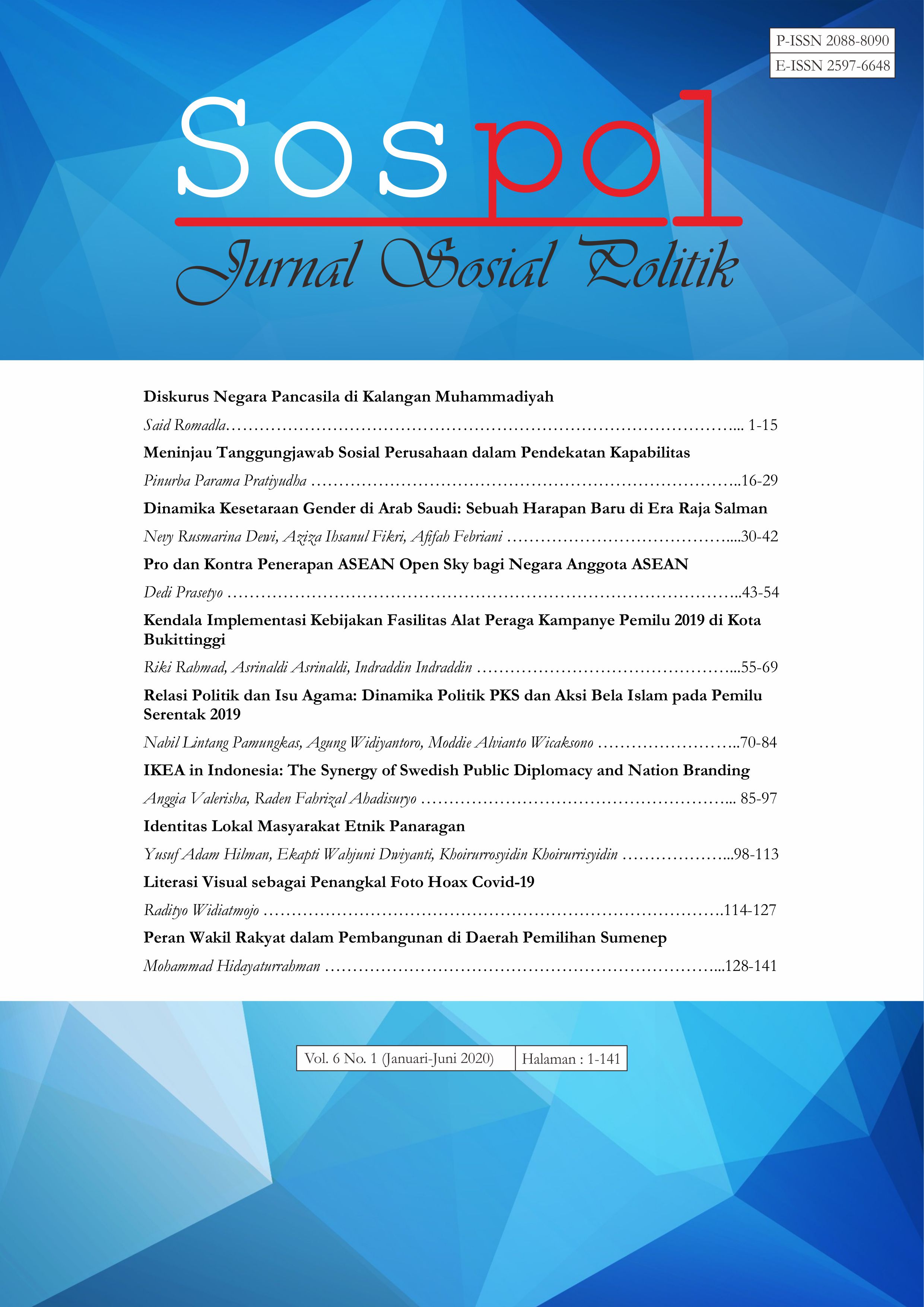Dinamika Kesetaraan Gender di Arab Saudi: Sebuah Harapan Baru di Era Raja Salman
DOI:
https://doi.org/10.22219/sospol.v6i1.11208Keywords:
gender, Islam, Salman, Saudi Arabia, womanAbstract
Saudi Arabia is one of the Moslem countries in the Middle East which limits women’s rights. These women have limited access to economy, education, as well as politics. 2009 was the milestone for women’s public participation in Saudi Arabia. This research aims to analyze the development of gender equality issue in Saudi Arabia which encourages policy changes in the era of King Salman. Gender is a character owned by someone in accordance with his/her social role based on his/her sex. Gender equality focuses on the equality of social role which is obtained by both men and women. In Koran surah Al- Baqarah article 288, there are two perspectives about women’s position which included normative and contextual aspects. Gender equality in Islamic’s perspective has been recognized in OKI’s Charter article 6. This research uses qualitative method with literature study approach. The result shows that the dynamic of policy changes in Saudi Arabia is influenced by the condition of Saudi’s women socio-cultural itself, the debate of the Ulama about gender equality which proposes Wassatiya’s perspective and Vision 2030 by Mohammad bin Salman as the hope of the implementation of the policy which gives a bigger opportunity for women’s role in public.
Downloads
References
Alarabiya. (2010). Nusus al-ikhtilat sahiha wa min khalifuni yuridu tadlil al-nas. Alarabiya.net.
Albarrak. (2010). Tahthir min fitna al-da‘wa ila al-ikhtilat. Albarrak.islamlight,net. Retrieved from http://albarrak.islamlight.net/index.php?optio n=content&task=view&id=17426.
Alwedinani, J. (2016). Gender and Subject Choice in Higher Education in Saudi Arabia. United Kingdom: University of York.
Anwar, E. (2015). The Ethics of Wasatiyah and the Pursuit of Gender Equality. In American Journal of Islamic Social Sciences (Vol. 32). International Institute of Islamic Thought (IIIT).
Ardiansyah. (2013). Pengaruh Mazhab Hanbali dan Pemikiran Ibnu Taimiyah dalam Paham Salafi. Analytica Islamica, 2(2).
Beritasatu.com. (2013, February 20). Dilantik, 30 Wanita Anggota Dewan Syura. Beritasatu.com. Retrieved from https://www.beritasatu.com/asia/97974-dilantik-30-wanita-anggota-dewan-syura-arab-saudi.html
CNNIndonesia. (2018, January 12). Kini, Wanita Saudi Boleh Menonton Sepak Bola di Stadion. Cnnindonesia.com. Retrieved from https://www.cnnindonesia.com/internasional/20180112172729-120-268481/kini-wanita-saudi-boleh-menonton-sepak-bola-di-stadion
Creswell, J. W. (2012). Educational Research. New York: Pearson.
Faktualnews. (2020). Perempuan Arab Saudi dari Waktu ke Waktu. Faktualnews.com. Retrieved from https://faktualnews.co/2020/01/04/perempuan-arab-saudi-dari-waktu-ke-waktu/185610/
Hodgett, D. J., & Stolte, O. M. E. (2012). Case-based Research in Community and social pychology: Introduction to the special issue. Journal of Community & Applied Social, 22.
Kompas. (2017, September 27). Akhirnya Arab Saudi Cabut Larangan Mengemudi bagi Perempuan. Kompas.com. Retrieved from https://internasional.kompas.com/read/2017/09/27/14051701/akhirnya-arab-saudi-cabut-larangan-mengemudi-bagi-perempuan
Kompas. (2019, October 7). “Putra Mahkota MBS, Sosok Kunci Dalam Reformasi Arab Saudi.” Kompas.com. Retrieved from https://internasional.kompas.com/read/2019/10/07/16163441/putra-mahkota-mbs-sosok-kunci-dalam-reformasi-arab-saudi?page=all
Lilolia, A. (2019). Perempuan Arab Saudi sedang berjuang untuk kebebasan - dan kesuksesan mereka terus bertambah. Retrieved from https://theconversation.com/perempuan-arab-saudi-sedang-berjuang-untuk-kebebasan-dan-kesuksesan-mereka-terus-bertambah-122269
Maslamah, & Muzani, S. (2014). Konsep-Konsep Gender Dalam Pespektif Islam. SAWWA, 9(2).
Meijer, R. (n.d.). Reform in Saudi Arabia: The Gender-Segregation Debate. Middle East Policy Council, 4(xvii). Retrieved from https://mepc.org/reform-saudi-arabia-gender-segregation-debate
Nuryatno, A. (2001). Islam, Teologi Pembebasan Dan Kesetaraan Gender (Studi Atas Pemikiran Ashgar Ali Engineer) (M. Shobirin, Ed.). Yogyakarta: UII Press.
Qodarsasi, U. (2014). Penyelesaian Kasus Kekerasan Terhadap Tenaga Kerja Wanita Indonesia di Malaysia Melalui Implementasi Konvensi CEDAW PBB 1979. Palastren, 7(1), 169–192.
Republika. (2013, November 23). Kenapa Muslimah Arab Saudi Dilarang Menyetir? Republika.co.id. Retrieved from https://www.republika.co.id/berita/dunia-islam/fatwa/13/11/23/mwplcw-kenapa-muslimah-arab-saudi-dilarang-menyetir
Republika. (2019, March 19). “Wajah Saudi Era 60-an, Masa Keterbukaan Untuk Perempuan.” Republika.com. Retrieved from https://www.republika.co.id/berita/dunia-islam/dunia/polnpj320/wajah-saudi-era-60an-masa-keterbukaan-untuk-perempuan.
Rohim, N. (2013). Kedudukan Konstitusi dalam Praktik Ketatanegaraan Saudi Arabia. Tahkim, IX(2).
Rosida, A. (2018). Wacana Modernisasi Dalam Tantangan Peradaban, Peran Perempuan Sebagai Tonggak Sejarah Arab Saudi. Jurnal Palita, 3(1).
statistica. (n.d.). Saudi Arabia has Become the World Biggest Arms Importer. Retrieved from https://www.statista.com/chart/3295/saudi-arabia-has-become-the-worlds-biggest-arms-importer/
UN. (2009). UN Women “Resolution 63/311 General Assembly.” Retrieved from https://undocs.org/A/res/63/311
UNDP. (2019). Inequalities in Human Development in the 21st Century Briefing note for countries on the 2019 Human Development Report. Retrieved from http://hdr.undp.org/sites/all/themes/hdr_theme/country-notes/SAU.pdf
Downloads
Published
How to Cite
Issue
Section
License
Authors who publish with this journal agree to the following terms:
- Authors retain copyright and grant the journal right of first publication with the work simultaneously licensed under a Creative Commons Attribution-ShareAlike 4.0 International License that allows others to share the work with an acknowledgement of the work's authorship and initial publication in this journal.
- Authors are able to enter into separate, additional contractual arrangements for the non-exclusive distribution of the journal's published version of the work (e.g., post it to an institutional repository or publish it in a book), with an acknowledgement of its initial publication in this journal.
- Authors are permitted and encouraged to post their work online (e.g., in institutional repositories or on their website) prior to and during the submission process, as it can lead to productive exchanges, as well as earlier and greater citation of published work (See The Effect of Open Access).

This work is licensed under a Creative Commons Attribution-ShareAlike 4.0 International License.



















